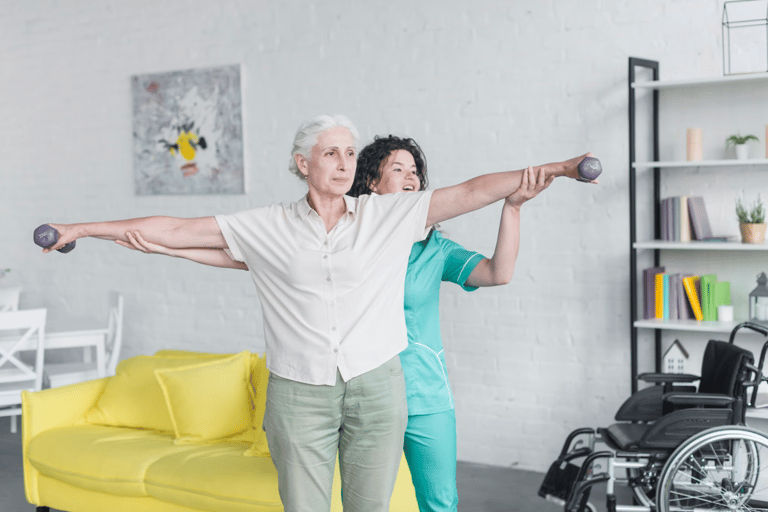Healthy Aging: The Importance of Physical Fitness and Exercises for the Elderly
As we age, it's essential to stay active and physically fit. Regular exercise has numerous benefits for older adults, including maintaining strength and flexibility, improving balance, and reducing the risk of falls and other health problems. In this blog post, we'll explore the importance of physical fitness for the elderly and share some exercises that our caregivers can do with clients.
INFORMATIVE
Erlyn A. Pinkston
5/9/20233 min read
Physical fitness is an essential aspect of maintaining health and well-being, particularly for older adults. Regular exercise has numerous benefits for seniors, including improved cardiovascular health, better mobility and balance, reduced risk of falls, and enhanced mood and mental health. At Unique Quality Care, we understand the importance of physical fitness for our clients and offer a range of exercise programs to promote overall health and well-being.
In this blog post, we will explore the importance of physical fitness for the elderly and share some exercises that our caregivers can do with their clients to promote physical activity and healthy aging.
Importance of Physical Fitness for the Elderly
As we age, our bodies naturally undergo changes, including a decrease in muscle mass and bone density. These changes can lead to a variety of health problems, including osteoporosis, arthritis, and an increased risk of falls. Regular exercise can help combat these issues and promote overall health and well-being.
Benefits of Regular Exercise for the Elderly
Regular exercise has numerous benefits for older adults, including:
Improved Cardiovascular Health: Exercise can help improve heart health and reduce the risk of cardiovascular disease.
Increased Strength and Flexibility: Exercise can help maintain muscle mass and flexibility, which can help prevent falls and injuries.
Improved Balance: Balance exercises can help reduce the risk of falls, which is a significant concern for older adults.
Reduced Risk of Chronic Diseases: Exercise can help reduce the risk of chronic diseases, such as diabetes, high blood pressure, and obesity.
Enhanced Mental Health: Exercise can also help improve mood, reduce stress and anxiety, and enhance overall mental health and well-being.
Increased longevity: Regular exercise has been linked to increased longevity, allowing seniors to live longer, healthier lives.
Exercises for the Elderly
When it comes to exercise for older adults, it's essential to choose activities that are safe and appropriate for their physical abilities. Here are some exercises that our caregivers can do with clients:
Walking: Walking is a low-impact exercise that is great for older adults. It can improve cardiovascular health, strengthen leg muscles, and improve overall fitness.
Chair Exercises: Chair exercises can help improve strength, flexibility, and balance. Examples include seated leg lifts, arm circles, and toe taps.
Stretching: Stretching can help improve flexibility, reduce muscle tension, and improve overall mobility. Our caregivers can assist with gentle stretching exercises.
Resistance Training: Resistance training can help maintain muscle mass and improve overall strength. Our caregivers can use resistance bands or light weights to perform exercises such as bicep curls and squats.
Yoga: Yoga is a gentle form of exercise that can improve flexibility, balance, and overall well-being. Our caregivers can assist with chair yoga or other modifications as needed.
Swimming: Swimming is a low-impact exercise that can be gentle on joints while providing a full-body workout. It can help to improve cardiovascular health, muscle strength, and overall mobility.
Assisting with Arthritis Care
Arthritis is a common condition among older adults that can cause joint pain and stiffness. Our caregivers can assist with arthritis care by:
Encouraging Regular Exercise: Regular exercise can help reduce arthritis pain and improve overall mobility. Our caregivers can help clients with exercises that are safe and appropriate for their physical abilities.
Assisting with Medications: Our caregivers can assist with reminding clients to take their arthritis medications and tracking any side effects.
Providing Emotional Support: Arthritis can be a challenging condition to manage, and our caregivers can provide emotional support and encouragement.


Conclusion
Physical fitness is essential for maintaining health and well-being as we age. Regular exercise can improve cardiovascular health, increase strength and flexibility, improve balance, and reduce the risk of chronic diseases. Our caregivers can assist with exercise routines and arthritis care to help clients maintain their physical health and mobility. By prioritizing physical fitness, older adults can enjoy an enhanced quality of life and independence.


Our Links
Mailing Address
P.O. Box 115 Garden Grove
CA 92842-115
